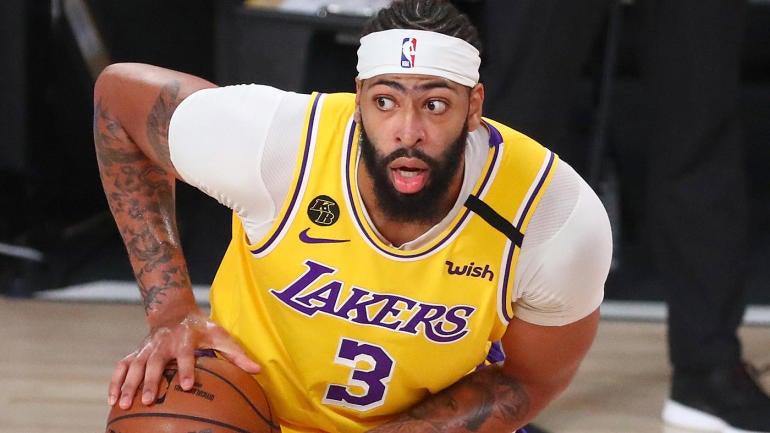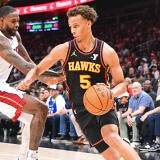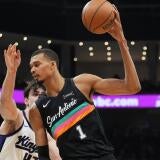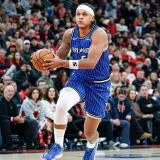Lakers vs. Heat NBA Finals: How Anthony Davis' passing has helped solve one of Los Angeles' biggest problems
The Lakers can finally generate bench offense, thanks to Davis' high basketball IQ

Every LeBron James team has the same weakness: His teams forget to play without him. This has even been true with superstar teammates. In three seasons with Kyrie Irving and Kevin Love in Cleveland, the Cavaliers were at least 16.1 points worse per 100 possessions with him on the bench than they were with him on the court. The numbers were similar in Miami even with Dwyane Wade and Chris Bosh typically sharing bench shifts, and they got even worse in the playoffs. In the 2017 NBA Finals, Cleveland played only 28 total minutes without James in the game ... and got outscored by 27 in those minutes. Losing LeBron essentially amounted to hemorrhaging a point per minute.
The Lakers experienced a similar phenomenon during the regular season. Prior to the midseason shutdown, the Lakers had a championship-level net rating with LeBron in the game, but played at roughly the level of the Magic and Pelicans when he sat. It makes sense. No matter who he plays with, James has such an enormous influence on everything that his team does that it has to essentially play an entirely different system when he sits. What bench player could simulate LeBron's impact?
As the Lakers found, none could. Their offense without LeBron in the game was aimless at best. When the shot clock inevitably wore down, they'd dump the ball into Anthony Davis and ask him to save them. Oftentimes, he couldn't:
Every metric paints the LeBron-less offense of the regular season as stagnant. Only the Warriors were worse offensively over the full season than the Lakers were in LeBron's bench minutes, and one of the primary causes of that decline was a lack of movement. Those clips above display almost no motion. The Lakers assisted on 61 percent of their field goals during LeBron's pre-pandemic minutes but only 58.5 when he sat. Davis can only do so much with four teammates standing around and watching him.
But the switch flipped in the postseason. The Lakers are winning those Davis-minus-LeBron minutes by 6.7 points per 100 possessions, according to Cleaning the Glass, and while some shooting luck plays a part in that, Davis' improved playmaking has been at the center of the turnaround.
The Lakers scored only 0.933 points per possession when Davis was doubled in the post in the regular season -- a tactic teams generally feel more comfortable employing when LeBron is on the bench. That's a below-average figure, yet it's an improvement on the majority of his career. Despite his point guard past, Davis has never been a point-guard-caliber passer.
Fast-forward to the playoffs. The Lakers are up to 1.115 points per possession on Davis doubles. Most of those points, especially in the Denver series, came from Davis finding cutters:
That's a fairly simple one, predicated on a high-IQ player taking advantage of a snoozing defense. The Lakers rarely made such basic plays during the regular season, but it's the baseline, and it's something he's grown more comfortable doing even without doubles:
Davis doesn't have to be Nikola Jokic, but he can't be Hassan Whiteside either. Fortunately, he's trending closer to the former this postseason. Even if it didn't lead to points, this cross-court pass was a beauty:
Whether LeBron is on the floor or not, Davis' situational awareness has taken a major step this postseason. Davis is one of the best pick-and-roll finishers in basketball. Nobody would blame him for thinking score here. Instead, he notices almost immediately that Rajon Rondo, the ball-handler, has snuck behind the defense for an easy two:
The best compliment Davis can be given for his passing is that, on some, smaller level, he's thinking the way that LeBron does. He understands what his gravity near the basket does to defenses and is making a conscious effort to kick the ball out behind the 3-point line when the opportunity presents itself:
These improvements are trickling down to the rest of the roster. Teammates are cutting more knowing that Davis can find them. Whereas the team assist rate fell when LeBron sat in the regular season, it has actually risen in the postseason from 61.6 percent to 63.5 percent. The Nuggets, for the season, assisted 63.6 percent of their field goals. Maybe Davis has more in common with Jokic than we thought.
He doesn't have to be for this growth to matter in the Finals. Davis is going to draw post-doubles against Miami. Some of them could come, essentially, from the opening tip. If the Lakers start with a center on the floor and Miami decides to guard him with Bam Adebayo, the smaller Jae Crowder won't be able to hand with Davis alone. If the Lakers go small, the doubles come when LeBron goes to the bench. Miami's zone is susceptible to precision passing as most zones are. Boston took advantage of that. Davis can showcase his own passing as well.
And if he does, the Lakers won't suffer the same fate as the Cavaliers. They don't need to dominate the LeBron bench minutes. They need to survive them. LeBron's old teams haven't been able to do that, but with him needing more rest at the age of 35, it is not an exaggeration to suggest that the Lakers cannot win this series if their reserve units can't score. Davis will be at the literal and figurative center of that movement. Fortunately, he's passed all of his passing tests so far with flying colors.


















